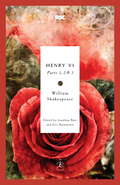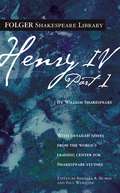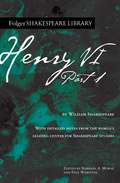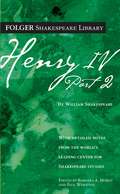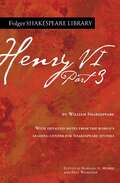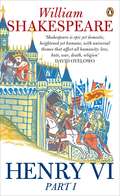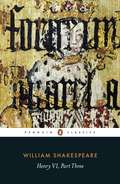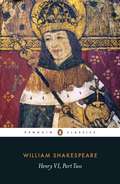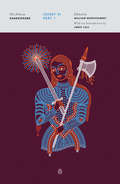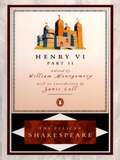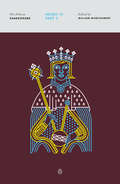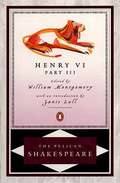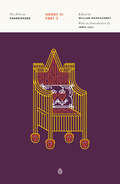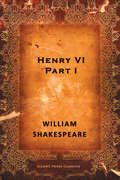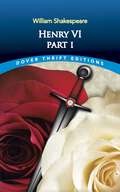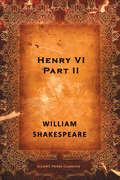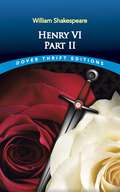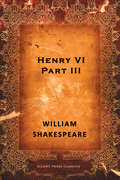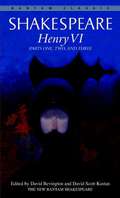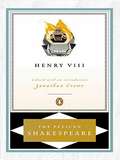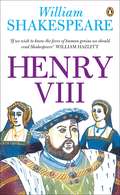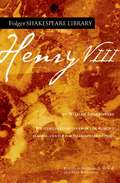- Table View
- List View
Henry VI
by William Shakespeare Jonathan Bate Eric RasmussenDisplaying the bold vision and growing skill of a young playwright, these are Shakespeare's first three history plays, covering some sixty tumultuous years of English history. Their pageantry, violence, and stirring speeches excite audiences with action as well as character, and midway through the final play in this trilogy, a shocking, clever, inimitably evil new voice is heard--that of Richard of Gloucester, destined to become England's most fearsome and hated ruler of all time, Richard III.From the Paperback edition.
Henry VI Part 1
by William Shakespeare Paul Werstine Dr Barbara MowatEach edition includes: Freshly edited text based on the best early printed version of the play Full explanatory notes conveniently placed on pages facing the text of the play Scene-by-scene plot summaries A key to famous lines and phrases An introduction to reading Shakespeare's language An essay by an outstanding scholar providing a modern perspective on the play Illustrations from the Folger Shakespeare Library's vast holdings of rare books Essay by Phyllis Rackin The Folger Shakespeare Library in Washington, D.C., is home to the world's largest collection of Shakespeare's printed works, and a magnet for Shakespeare scholars from around the globe. In addition to exhibitions open to the public throughout the year, the Folger offers a full calendar of performances and programs. For more information, visit www.folger.edu.
Henry VI Part 1 (Folger Shakespeare Library)
by William ShakespeareThe authoritative edition Henry VI, Part 1 from The Folger Shakespeare Library, the trusted and widely used Shakespeare series for students and general readers.Henry VI, Part 1 is an uncompromising celebration of early English nationalism that contrasts the English with the French, portrayed here as effeminate and scheming. A boy king, Henry VI, is on the English throne, and the indomitable Talbot leads the English cause in France. Joan La Pucelle (Joan of Arc), who becomes captain of the French, claims to be chosen by the Virgin Mary to liberate France. The English, however, consider her a sensual witch. Many of the English nobility remain, quarreling, at home. Once in France, some seek permission to fight each other there. Talbot and his son cannot prevail; the English defeat themselves by preying on each other. This edition includes: -Freshly edited text based on the best early printed version of the play -Full explanatory notes conveniently placed on pages facing the text of the play -Scene-by-scene plot summaries -A key to the play&’s famous lines and phrases -An introduction to reading Shakespeare&’s language -An essay by a leading Shakespeare scholar providing a modern perspective on the play -Fresh images from the Folger Shakespeare Library&’s vast holdings of rare books -An annotated guide to further reading Essay by Phyllis Rackin The Folger Shakespeare Library in Washington, DC, is home to the world&’s largest collection of Shakespeare&’s printed works, and a magnet for Shakespeare scholars from around the globe. In addition to exhibitions open to the public throughout the year, the Folger offers a full calendar of performances and programs. For more information, visit Folger.edu.
Henry VI Part 2
by William Shakespeare Paul Werstine Dr Barbara MowatEach edition includes: Freshly edited text based on the best early printed version of the play Full explanatory notes conveniently placed on pages facing the text of the play Scene-by-scene plot summaries A key to famous lines and phrases An introduction to reading Shakespeare's language An essay by an outstanding scholar providing a modern perspective on the play Illustrations from the Folger Shakespeare Library's vast holdings of rare books Essay by Nina Levine The Folger Shakespeare Library in Washington, D.C., is home to the world's largest collection of Shakespeare's printed works, and a magnet for Shakespeare scholars from around the globe. In addition to exhibitions open to the public throughout the year, the Folger offers a full calendar of performances and programs. For more information, visit www.folger.edu.
Henry VI Part 3 (Folger Shakespeare Library)
by William ShakespeareThe authoritative edition of Henry VI, Part 3 from The Folger Shakespeare Library, the trusted and widely used Shakespeare series for students and general readers.Henry VI, Part 3 is dominated by a struggle between two military forces, neither of which can achieve victory for long. Until the end, the Yorkists and Lancastrians strive for the English crown. The conflict between these two families began under Richard II. Half a century later, during the reign of Henry VI, it moved toward civil war. Now, in Henry VI, Part 3, Henry&’s long reign becomes intermittent as his cousin Richard, Duke of York, seeks the crown and York&’s son Edward sporadically succeeds in seizing it. As we watch the crown pass back and forth between Henry VI and Edward IV, our attention is caught by other characters: the Earl of Warwick, Queen Margaret, and Richard, Duke of Gloucester. Warwick is the power behind the challenge to Henry VI, until he shifts to Henry. Margaret raises an army in England and later leads one from France, all in a futile attempt to secure the throne for her son, Prince Edward. Historically, his death destroyed her, but Shakespeare wisely saves Margaret to bring her back in Richard III. Richard, Duke of Gloucester, increasingly draws our attention. Both attractive and repellent, he is energetic, self-aware, bitter about his deformity, ruthless, and unable to care about others. This edition includes: -Freshly edited text based on the best early printed version of the play -Full explanatory notes conveniently placed on pages facing the text of the play -Scene-by-scene plot summaries -A key to the play&’s famous lines and phrases -An introduction to reading Shakespeare&’s language -An essay by a leading Shakespeare scholar providing a modern perspective on the play -Fresh images from the Folger Shakespeare Library&’s vast holdings of rare books -An annotated guide to further reading Essay by Randall Martin The Folger Shakespeare Library in Washington, DC, is home to the world&’s largest collection of Shakespeare&’s printed works, and a magnet for Shakespeare scholars from around the globe. In addition to exhibitions open to the public throughout the year, the Folger offers a full calendar of performances and programs. For more information, visit Folger.edu.
Henry VI Part One
by William ShakespeareAfter the death of Henry V, the French revolt and threaten to reclaim their country from English rule. Guided by his Lord Protector, the young King Henry VI journeys to Paris to reaffirm his rule over France. But while Joan of Arc battles the British abroad, discontent is also breeding at home, between the two ancient Houses of York and Lancaster.
Henry VI Part Three
by William ShakespeareHenry VI Part III is the third of William Shakespeare's plays set during the lifetime of King Henry VI of England, and prepares the ground for one of his best-known and most controversial plays: the tragedy of King Richard III (Richard III of England). It follows on from Henry VI, part 1 and Henry VI, part 2.
Henry VI Part Two
by William ShakespeareHenry VI is tricked into marrying Margaret - lover of the Earl of Suffolk, who hopes to rule the kingdom through her influence. There is one great obstacle in Suffolk's path, however - the noble Lord Protector, who he slyly orders to be murdered. Discovering this betrayal, Henry banishes Suffolk, but with his Lord Protector gone the unworldly young King must face his greatest challenge: impending Civil War and the rising threat of the House of York.
Henry VI, Part 1
by William ShakespeareOne of Shakespeare's history plays. First of a four-play series, including Henry VI Parts 2 and 3 and Richard III.
Henry VI, Part 1 (The Pelican Shakespeare)
by William Shakespeare Stephen Orgel A. R. Braunmuller William Montgomery Janis LullThe acclaimed Pelican Shakespeare series edited by A. R. Braunmuller and Stephen Orgel The legendary Pelican Shakespeare series features authoritative and meticulously researched texts paired with scholarship by renowned Shakespeareans. Each book includes an essay on the theatrical world of Shakespeare’s time, an introduction to the individual play, and a detailed note on the text used. Updated by general editors Stephen Orgel and A. R. Braunmuller, these easy-to-read editions incorporate over thirty years of Shakespeare scholarship undertaken since the original series, edited by Alfred Harbage, appeared between 1956 and 1967. With definitive texts and illuminating essays, the Pelican Shakespeare will remain a valued resource for students, teachers, and theater professionals for many years to come. For more than seventy years, Penguin has been the leading publisher of classic literature in the English-speaking world. With more than 1,800 titles, Penguin Classics represents a global bookshelf of the best works throughout history and across genres and disciplines. Readers trust the series to provide authoritative texts enhanced by introductions and notes by distinguished scholars and contemporary authors, as well as up-to-date translations by award-winning translators.
Henry VI, Part 2
by William Shakespeare Stephen Orgel A. R. Braunmuller"I feel that I have spent half my career with one or another Pelican Shakespeare in my back pocket. Convenience, however, is the least important aspect of the new Pelican Shakespeare series. Here is an elegant and clear text for either the study or the rehearsal room, notes where you need them and the distinguished scholarship of the general editors, Stephen Orgel and A. R. Braunmuller who understand that these are plays for performance as well as great texts for contemplation." (Patrick Stewart) The distinguished Pelican Shakespeare series, which has sold more than four million copies, is now completely revised and repackaged. Each volume features: * Authoritative, reliable texts * High quality introductions and notes * New, more readable trade trim size * An essay on the theatrical world of Shakespeare and essays on Shakespeare's life and the selection of texts
Henry VI, Part 2 (The Pelican Shakespeare)
by William ShakespeareThe acclaimed Pelican Shakespeare series edited by A. R. Braunmuller and Stephen Orgel The legendary Pelican Shakespeare series features authoritative and meticulously researched texts paired with scholarship by renowned Shakespeareans. Each book includes an essay on the theatrical world of Shakespeare’s time, an introduction to the individual play, and a detailed note on the text used. Updated by general editors Stephen Orgel and A. R. Braunmuller, these easy-to-read editions incorporate over thirty years of Shakespeare scholarship undertaken since the original series, edited by Alfred Harbage, appeared between 1956 and 1967. With definitive texts and illuminating essays, the Pelican Shakespeare will remain a valued resource for students, teachers, and theater professionals for many years to come. For more than seventy years, Penguin has been the leading publisher of classic literature in the English-speaking world. With more than 1,700 titles, Penguin Classics represents a global bookshelf of the best works throughout history and across genres and disciplines. Readers trust the series to provide authoritative texts enhanced by introductions and notes by distinguished scholars and contemporary authors, as well as up-to-date translations by award-winning translators.
Henry VI, Part 3
by William Shakespeare"I feel that I have spent half my career with one or another Pelican Shakespeare in my back pocket. Convenience, however, is the least important aspect of the new Pelican Shakespeare series. Here is an elegant and clear text for either the study or the rehearsal room, notes where you need them and the distinguished scholarship of the general editors, Stephen Orgel and A. R. Braunmuller who understand that these are plays for performance as well as great texts for contemplation. " (Patrick Stewart) The distinguished Pelican Shakespeare series, which has sold more than four million copies, is now completely revised and repackaged. Each volume features: * Authoritative, reliable texts * High quality introductions and notes * New, more readable trade trim size * An essay on the theatrical world of Shakespeare and essays on Shakespeare's life and the selection of texts .
Henry VI, Part 3 (The Pelican Shakespeare)
by William ShakespeareThe acclaimed Pelican Shakespeare series edited by A. R. Braunmuller and Stephen Orgel The legendary Pelican Shakespeare series features authoritative and meticulously researched texts paired with scholarship by renowned Shakespeareans. Each book includes an essay on the theatrical world of Shakespeare’s time, an introduction to the individual play, and a detailed note on the text used. Updated by general editors Stephen Orgel and A. R. Braunmuller, these easy-to-read editions incorporate over thirty years of Shakespeare scholarship undertaken since the original series, edited by Alfred Harbage, appeared between 1956 and 1967. With definitive texts and illuminating essays, the Pelican Shakespeare will remain a valued resource for students, teachers, and theater professionals for many years to come. For more than seventy years, Penguin has been the leading publisher of classic literature in the English-speaking world. With more than 1,700 titles, Penguin Classics represents a global bookshelf of the best works throughout history and across genres and disciplines. Readers trust the series to provide authoritative texts enhanced by introductions and notes by distinguished scholars and contemporary authors, as well as up-to-date translations by award-winning translators.
Henry VI, Part I: A History
by William ShakespeareAfter the death of King Henry V, King Henry VI must ascend to the throne amist the chaos of the Hundred Years' War and internal struggles closer to home that threaten the British monarchy.
Henry VI, Part I: Webster's Spanish Thesaurus Edition (Dover Thrift Editions)
by William ShakespeareWith the untimely death of England's great soldier-king, Henry V, the crown passes to his young and inexperienced son. While the nobles quarrel among themselves and compete for influence over the new monarch, the French seize the opportunity to reclaim their former territories from English possession. The success of the French armies rests upon an unlikely leader: the peasant girl Joan La Pucelle, known to history as Joan of Arc.The first of three plays based on the life of the England's 15th-century monarch, this historical drama chronicles the conflict between the York and Lancaster factions that led to the War of the Roses. Each part of the trilogy is self-contained and can be appreciated without knowledge of the others. Vivid characterization, dark comedy, and powerful language combine for a memorable portrait of a country devastated by civil war.
Henry VI, Part II: A History
by William ShakespeareKing Henry VI's reign is beset with infighting among the nobility as the War of the Roses breaks out in full and the king faces open rebellion as the Duke of York makes a claim for the throne .
Henry VI, Part II: Webster's Chinese Simplified Thesaurus Edition (Dover Thrift Editions)
by William ShakespearePreferring a life of spiritual contemplation, Henry VI leaves politics to his nobles. The resulting power struggle pits the Houses of York and Lancaster against one another for control of the crown. Against a backdrop of violent rebellion, the play explores the relationship between law and justice and the extent of a ruler's authority.The second of three plays based on the life of England's fifteenth-century monarch, this historical drama chronicles the conflicts behind the War of the Roses. Each part of the trilogy is self-contained and can be appreciated without knowledge of the others. Vivid characterization, dark comedy, and powerful language combine for a memorable portrait of a country devastated by civil war.
Henry VI, Part III: A History
by William ShakespeareKing Henry VI is now on the run, defending his crown from the Yorkists in a conflict that will determine the fate of the British monarchy.
Henry VI: Parts One, Two and Three
by William ShakespeareThese are Shakespeare's first three history plays, covering some sixty years of English history. In the final play, a distinctively evil voice is heard--that of Richard III, destined to become England's most fearsome and hated ruler of all time.
Henry VIII
by William Shakespeare Stephen OrgelWith new editors who have incorporated the most up-to-date scholarship, this revised Pelican Shakespeare series will be the premiere choice for students, professors, and general readers well into the twenty-first century. Each volume features: * Authoritative, reliable texts* High quality introductions and notes* New, more readable trade trim size* An essay on the theatrical world of Shakespeare and essays on Shakespeare's life and the selection of texts
Henry VIII
by William ShakespeareConspiracies and intrigue are rife in the court of Henry VIII as a Duke is executed for treason, having been tricked by the Cardinal. And when the King falls in love with Anne Bullen and decides to divorce his wife, he causes an irrevocable rift with the Catholic Church. After the King's secret marriage to Anne courtiers fall in and out of favour and deaths abound, with far-reaching consequences.
Henry VIII (Folger Shakespeare Library)
by William Shakespeare Paul Werstine Barbara MowatIn Henry VIII, Shakespeare presents a monarchy in crisis. Noblemen battle with Lord Chancellor Cardinal Wolsey, who taxes the people to the point of rebellion. Witnesses whom Wolsey brings against the Duke of Buckingham claim he is conspiring to take the throne, yet Buckingham seems innocent as he goes to his death. Henry is also without a male heir. After meeting the beautiful Anne Bullen, he says that he suspects his current marriage to Katherine, with whom he has one surviving daughter, is invalid. Katherine, meanwhile, glows with such splendid integrity that actresses have long desired the role. She advocates for the people, suspects the witnesses against Buckingham, and eloquently defends her conduct as Henry’s wife. The authoritative edition of Henry VIII from The Folger Shakespeare Library, the trusted and widely used Shakespeare series for students and general readers, includes: -Freshly edited text based on the best early printed version of the play -Full explanatory notes conveniently placed on pages facing the text of the play -Scene-by-scene plot summaries -A key to the play’s famous lines and phrases -An introduction to reading Shakespeare’s language -An essay by a leading Shakespeare scholar providing a modern perspective on the play -Fresh images from the Folger Shakespeare Library’s vast holdings of rare books -An annotated guide to further reading Essay by Barbara A. Mowat The Folger Shakespeare Library in Washington, DC, is home to the world’s largest collection of Shakespeare’s printed works, and a magnet for Shakespeare scholars from around the globe. In addition to exhibitions open to the public throughout the year, the Folger offers a full calendar of performances and programs. For more information, visit Folger.edu.
